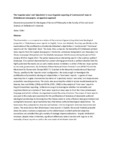Please use this identifier to cite or link to this item:
https://cris.library.msu.ac.zw//handle/11408/1693| Title: | The ‘reporter voice’ and ‘objectivity’ in cross linguistic reporting of ‘controversial’ news in Zimbabwean newspapers. an appraisal approach | Authors: | Sabao, Collen | Keywords: | Reporter voice, cross-linguistic reporting | Issue Date: | 2013 | Publisher: | Stellenbosch University | Abstract: | The dissertation is a comparative analysis of the structural (generic/cognitive) and ideological properties of Zimbabwean news reports in English, Shona and Ndebele, focusing specifically on the examination of the proliferation of authorial attitudinal subjectivities in ‘controversial’ ‘hard news’ reports and the ‘objectivity’ ideal. The study, thus, compares the textuality of Zimbabwean printed news reports from the English newspapers (The Herald, Zimbabwe Independent and Newsday), the Shona newspaper (Kwayedza) and the Ndebele newspaper (Umthunywa) during the period from January 2010 to August 2012. The period represents an interesting epoch in the country’s political landscape. It is a period characterized by a power-sharing government, a political situation that has highly polarized the media and as such, media stances in relation to either of the two major parties to the unity government, the Zimbabwe African National Union Patriotic Front (ZANU PF) and the Movement for Democratic Change (MDC-T). Couched in the theoretical explications of Appraisal Theory, specifically the ‘reporter voice’ configuration, the study sought to investigate the proliferation of journalistic ideological subjectivities in ‘hard news’ reports – a genre of news reporting that is largely characterised by claims of ‘objectivity’ and/or ‘neutrality’ and dispassionate journalistic reporting positions. The study, also assuming the orbital structure model developed by Iedema, Feez and White (1994) and White (1997, 1998) in the analysis of ‘hard news’ report in English broadsheet reporting, furthermore sought to investigate whether the textuality and cognitive/rhetorical structure of ‘hard news’ reports in news reports from the three Zimbabwean language journalistic cultures are organised around the same structure. The corpus of news reports analysed in this study were examined for the proliferation of instances of observable authorial ideological positionings by focusing how the choices made in terms of lexical, lexicogrammatical and syntagmatic resources signal evaluative keys that betray authorial ideological subjectivities. The texts were, thus, subjected to close textual analyses in terms of generic structure and journalistic voices. The study shows that Zimbabwean news reports in English, Shona and Ndebele generally share the same structure as expressed by the orbital model, in which authorial subjective evaluations are curtailed through a variety of strategic impersonalisations – largely ‘attribution’. However, despite these similarities, significant differences were observed with regards to the textuality of news reports as well as the uses made of attributed materials. | Description: | Thesis | URI: | http://www.isfla.org/Systemics/Print/Theses/sabao_reporter_2013.pdf http://hdl.handle.net/11408/1693 |
| Appears in Collections: | Thesis |
Files in This Item:
| File | Description | Size | Format | |
|---|---|---|---|---|
| Sabao thesis.pdf | 218.75 kB | Adobe PDF |  View/Open |
Page view(s)
106
checked on Feb 26, 2025
Download(s)
26
checked on Feb 26, 2025
Google ScholarTM
Check
Items in MSUIR are protected by copyright, with all rights reserved, unless otherwise indicated.


